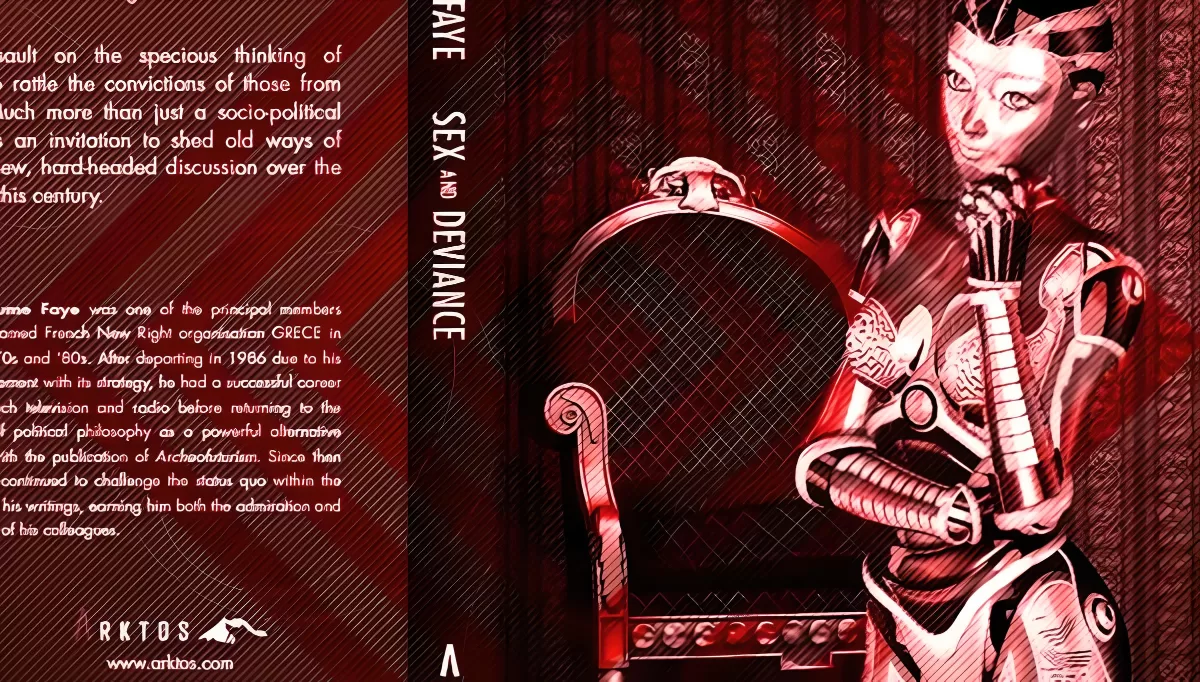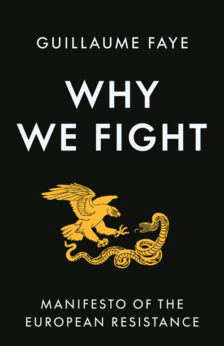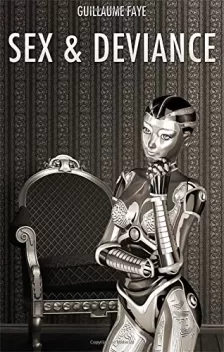The fertile and long-lasting heterosexual family unit is in steep decline among Europeans, which explains the dramatic drop in their birth rates. This decline has many secondary causes, but they all lead back to a single primary cause: the excessive individualism associated with egalitarianism. Paradoxically, the origin of this individualism lies in Christianity.
Nothing really opposes the traditional heterosexual family, but everything is discouraging it, starting with the general ideological character of our time.
In my view, the ultimate cause of the slow decline of the couple and the traditional family lies not with the ideology of the conservative Right, which is bound up with the Enlightenment and the triumph of individualism, consumerism, feminism, and so on. These aspects are pertinent, but they are secondary causes.
The principal reason for the decline of the enduring, fertile family, as of the stable heterosexual couple, is the conflation of conjugality with sexual love, or ‘marriage for love’.
This is a conflation on three levels: lineage, sex, and love. It is a distant and paradoxical consequence of the Christian vision of marriage and sex. I say this with all due moderation and caution that, paradoxically, bourgeois marriage (which was the outcome of Christian love) was able to reach a point of equilibrium. But it has gone past this point. In a world of perpetual becoming,1 there is never any lasting equilibrium; all is subject to reconstruction; all is subject to readjustment.
The Disappearance of the Lasting Couple
It might be asked whether an overly refined sexuality (marked, let us say, by ‘sensuality’, or erotic individualism) is not incompatible with the traditional large family. The erotomaniac is not identified with the image of the family father, nor the ‘liberated woman’ with that of the family mother. Sexual austerity seems to be the condition in the West for stable couples with numerous children, just as the inevitable and necessarily hypocritical separation between (open) conjugal sexuality and (dissimulated) libidinal sexuality is a paradoxical condition for the stable, fertile couple. Deceiving one’s spouse is not a case of simply having discreet sexual adventures, but of having a stable, permanent lover; that is, breaking the conjugal (and familial) pact, which is not simply a matter of sex, and may not even include sex.
On the other hand, the problem can be approached from different directions: a society cannot reproduce itself in the long term if there is a confusion and equivalence of roles between man and woman. The stable, fertile couple presupposes recognition of the radical differentiation between the genders, which is completely contrary to the current prevailing ideology (see the critique of Gender Theory, below).
* * *
The ideology of love, obviously of Christian origin, has done considerable harm not only on the political level (as we shall see later on), but also at the level of the family. Firstly, marriage for love, then amorous concubinage, have been the grave of the family and of the stable couple, by a very complex sociological process.
Since the 1960s, an explosion in the rate of divorce, the number of single-parent families, the spectacular growth in the number of bachelors, the social isolation of the elderly, the educational deficiencies, and so on, have all marked the collapse of the traditional family in the West.
Sociologists speak of an explosion of ‘happy divorces’. The rate of divorce by mutual consent or joint request is exploding.2 One often sees a father, his ex-wife and the new stepfather going on vacation or getting along (superficially, in fact) with the children of the first as well as of the second marriage. In the schools, the number of children who are part of a permanent and stable traditional family with parents who have never divorced is becoming a minority. Two newly divorced spouses form a family reconstituted from the children of both. President Sarkozy’s family, before his second divorce and third marriage, set the example at the very moment of his election as head of state.
The 2004 Act, by drastically simplifying that of 1975 on divorce by mutual consent, in fact instituted divorce by repudiation — an undertaking which is viable even without the consent of one’s spouse. This means that it is not civil unions which have been elevated to the rank of marriage, but marriage which has been lowered to the rank of a civil union. Moreover, a majority of deputies on the Right in 2010 rejected a proposed amendment aiming to make marriage fiscally more advantageous than civil unions. In fact, we are witnessing the suppression of marriage as the institution which prevailed, broadly speaking, among all social classes for several centuries.
As the sociologist Jean-Claude Le Goff writes:
In the 1950s and 1960s, institutions like marriage carried more weight, as well as both an affective and institutional dimension. Keeping a mistress was tolerated, but divorce strongly disapproved of. Since the 1970s, the institutional dimension of marriage has been steadily disappearing. Couples find the divorce procedure far easier on the social level, but the drama, experienced in a more private way, is intensified and sometimes becomes even more difficult to live through. Part of the current of the times is not showing that one is affected by it. Our society refuses to recognise what is tragic. But the psyche is subject to influence, and this cannot wilfully be prevented. Feelings leave their traces in the unconscious, and it is not always good to bury them.3
Couples, increasingly immature and afflicted by extended adolescence, separate at the first storm and as soon as the phase of infatuation ends. This is very harmful for the mental development of children (particularly when the family unit undergoes reconstitution), since it disconnects the ideas of conjugality and parenthood.
Previously, people stayed together and overcame their difficulties as a couple because of the children and out of faithfulness to the family lineage, committing to raising children together in a wholesome and stable environment. Today, self-interested individualism is rampant and couples break up in spite of the children. Despite all the treacly talk about compassion and protection, children, mere luxury playthings, are no longer prioritised.
In the midst of these deformed families, the psychological development — indeed, the intellectual capacities — of children and adolescents are necessarily hugely disturbed. This is a real step backwards from the European family model. Blood ties are broken. Insofar as the family is a microcosm of the nation (the cell to its body, guaranteeing its homogeneity), the loss of the very concept of family lineage and that of family tradition and inheritance (in both the biological and social senses) is one of the root causes of the loss of ethnic and racial conscience, as well as indifference to miscegenation and colonisation by mass immigration.
[…]The Politicisation of Love: Symptom of Neo-Totalitarianism
The overuse of the word ‘love’ is characteristic of our age, in the English-speaking world especially. We should also note the overabundant use of the term ‘love’ in Christian rhetoric since the 1960s. ‘God is Love’ is a theological affirmation seldom used by Christianity until the middle of the twentieth century, and unknown to Judaism and Islam. The increase in references to love in Western ideology is a secularisation of Christian charity, paradoxically coinciding with massive dechristianisation. At the same time, churches have converted to the worship of the Rights of Man,4 formerly rejected because of its profane and materialist character. This cult forms the basis of the official and quasi-legally binding Western ideological Vulgate, from which arise three principal imperatives: humanitarianism, anti-discriminationism, and anti-racism — each inscribed on the tablets of the law.5
This politicisation of the idea of love has occasioned not only a gigantic tidal-wave of humanitarian discourse, but also immense public expenditure, especially in favour of growing foreign populations whose parasitic character it is illegal to denounce. The unbridled humanitarian cult of love for the Other is not merely a symbol of emasculation and ethnomasochism in Western populations (as I have demonstrated many times in other writings),6 it is also accompanied by — and this is only an apparent paradox — an explosion in social violence (criminality), violence of representation (audiovisual media), a weakening of civic and economic honesty, the withdrawal of citizens into communitarian folds, the expansion of Islamist fanaticism, the appearance of barbarous primitivism in a large fringe of the youth (mainly of foreign origin despite discrimination in their favour) and, for working and middle class native French, severe deterioration of their quality of life and their civil liberties.
This ideology of obligatory love for the Other functions as a soft form of totalitarianism, in which public discourse flies in the face of observable social facts — a phenomenon similar in part to what was seen in the Soviet Union, though minus the gulags. Power is monopolised by a doctrinaire professorial caste with exclusive access to the mass media, whose ideas are not shared by the majority of the native population. Opponents can only express themselves in marginal outlets, and even then at the risk of defying the law. For, as Marxist-Leninists used to do in Communist countries in order to protect their dogma, this caste has reintroduced limitations (which get more extensive over time) on freedom of expression and even of thought, not to mention limitations on property rights and the freedom to hire at will.7 This ideology, protected by a generation of judges who share it (whether sincerely or not matters little), does not hesitate to violate the Declaration of the Rights of Man to whose authority they appeal in order to justify unconstitutional freedom-killing laws and in order to leave the realm of positive law by a return to subjective, introspective law, similar to Soviet or medieval law. As in the Soviet world, today’s ideologues are not content with disseminating their views via the communications media, but seek also to diffuse it monopolistically through the school system (primary to post-secondary), which has ceased to be an apparatus of public instruction only to become one of public upbringing, i.e., a propaganda apparatus in the service of official dogma, especially in matters of history and morality.
It can be said without exaggeration that in today’s ‘free’ Europe, as in the totalitarian regimes of the early twentieth century described by Hannah Arendt,8 the media, culture, and the educational system agree in not diffusing anything but this ideology, and that any who violate it are either marginalised or otherwise punished. Everything is done to keep their voice from being heard. The internet as well is clearly subject to censorship, if not total shutdown of some websites. (The internet’s reach is exaggerated anyway, given the dilution of messages in the enormous mass of competing messages, and with so many niche websites.) But above all, those websites most frequented by the ‘general public’ — the only effective ones — are impermeable by any dissident thought. Disagreements can only be expressed (under surveillance) in sealed bubbles visited only by those in the know.
Finally, the covert (and sometimes avowed) purpose of this ideology of love for the Other, or xenophilia, is the destruction of the European peoples in the cultural and physical sense, i.e., the disappearance of Europe. The constant defence of race-mixing and immigration — supposedly so beneficial — along with the prohibition on opposing them are a part of this strategy, just like the numerous attempts to destroy national historical memory, or the imposition of officially subsidised faux-art. The central paradigm of the ideology of love for the Other is: ‘The Other is better than we are; we must learn from him, for we are inherently guilty and bad; the Other is more at home among us than we are.’9 This amounts to a monstrous deformation of Christian charity, which results in a totalitarian ideology that destroys all social bonds and produces violence and servility.
References
1 The ontological concept of ‘becoming’ traces back to the pre-Socratic Greek philosopher Heraclitus, who stipulated that the world is in a perpetual flux, with the only constant being change and eternal becoming. –Ed.
2 63,881 in 2004 and 91,850 in 2005 out of a total of over 150,000 divorces.
3 Le Figaro, 25 September 2007.
4 The Declaration of the Rights of Man and of the Citizen was one of the principal documents stipulating the terms to be taken up in post-revolutionary France, namely that citizens ought to be recognised as born free and equal. It was passed by France’s National Constituent Assembly in 1789. –Ed.
5 On this point, see Eric Delcroix, Le théâtre de Satan (Paris: L’Æncre, 2002).
6 See especially Guillaume Faye’s Why We Fight. –Ed.
7 In the name of anti-discrimination, officially sanctioned associations ‘test’ to find out whether proprietors, real estate agencies, or companies refuse to house or hire applicants on the grounds of their ethnic origin. In reality, this amounts to creating an atmosphere of fear: as the fear of accusations of racism manifests as favouritism towards those of African and Arab origin, even when they do not fit the profile necessary to be accepted.
8 Hannah Arendt, The Origins of Totalitarianism (New York: Harcourt, Brace & World, 1966).
9 ‘We are France!’ ran the slogan of SOS Racism, a state-subsidised association, during its ‘Concert for Equality’ in Paris’ Champs de Mars on 14 July 2011. The message was aggressive; implicit, but clear: ‘We are appropriating your land, and you, native Frenchmen, with your culture and history, are no longer the owners.’ If this had not been the message, the slogan would have been: ‘We too are France.’











I guess the author thinks Christianity is Boomer Evangelical Christianity. There’s no nuance.